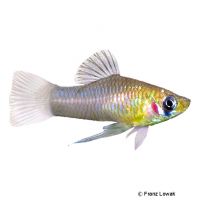Merry Widow Livebearer (Phallichthys amates)
| Merry Widow Livebearer Phallichthys amates | |
|---|---|
| Name | Merry Widow Livebearer |
| Name Lat. | Phallichthys amates |
| Synonym | Poecilia amates |
| Family | Livebearers |
| Family lat. | Poeciliidae |
| Order | Killifishes & Livebearers |
| Order lat. | Cyprinodontiformes |
| Origin | Central America |
| Habitat | Streams, ponds |
| Diet | Omnivore |
| pH | 6.5-7.5 |
| Behavior | Peaceful |
| Keeping | Group |
| Care Level | Moderate |
| Reproduction | Livebearer |
| Breeding | Simple |
| Life Span | 3-5 years |
| Protection | No |
| Metric Units | |
| Size | 3-6 cm |
| Temperature | 22-28 °C |
| Hardness | 10-20 °dH |
| Aquarium | 50 l |
| US Units | |
| Size | 1.2"-2.4" |
| Temperature | 72-82 °F |
| Hardness | 178-356 ppm |
| Aquarium | 15 gal |
Distribution and habitat
The natural distribution area of the Guatemala cichlids is in Guatemala, Panama and Honduras. They live mainly in shallow, slow-flowing or stagnant waters with sometimes dense underwater vegetation.
Maintenance
The aquarium should have a varied planting, with shelters and hiding places (roots) and provide sufficient swimming space. A soft substrate covered with some foliage (sea almond tree, oak), slightly shaded light (floating plants) and medium hard water is ideal.
No ammonia, ammonium and nitrite should be detectable, the nitrate value should not exceed 100 mg/l. To ensure the water quality and oxygen content, a filter and heater adapted to the aquarium size is required, as well as lighting for the species-appropriate day-night rhythm of the animals.
Diet
In the wild they feed on small insects, larvae, algae and detritus. The food supply consists of live or frozen food, such as cyclops, daphnia, artemia and mosquito larvae or a commercially available frozen special food mix, supplemented with high-quality dry food (flakes, granules). In addition, they need regular vegetable food, such as algae leaves or dry food with high vegetable content (spirulina, kelp).
Regular and varied feeding promotes health and prevents deficiency symptoms. Only feed as much as is eaten within a few minutes.
Behaviour and compatibility
They are sociable and peaceful fish that should be kept in a group of at least 5. Socialization with small, peaceful fish such as Rasboras, Tetras, Corydoras or other live-bearing fish is very possible.
Basically, only compatible fish species with similar demands on water condition and water temperature should be socialized.
Sex dimorphism
Males are smaller and have an anal fin (gonopodium) that has been transformed into a mating organ. The females are larger and appear rounder.
Reproduction and breeding
They are live-bearing fish. Internal fertilization is provided by the male's gonopodium. After about 4 weeks of gestation, up to 60 fry are born. They are already fully developed and independent at birth. After filling their swim bladder at the water surface, they can immediately start feeding.
Fry must be fed several times a day with special rearing food (e.g. dust food, Artemia nauplii). Breeding is hardly possible in community tanks, as the fry are easy prey.
Important
Soft water is not tolerated well in the long run and makes them susceptible to disease.
The foliage (sea almond tree, oak, etc.) when rotting promotes the development of microorganisms, which are a valuable secondary food source.
The well-being of the fish should be monitored regularly. Temperature should be checked daily, pH, hardness and nitrate levels at least every 14 days. Regular partial water changes are recommended, even when contaminant levels have not yet reached the upper limit. Sudden changes in water quality should be avoided. Newly introduced fish must be accustomed slowly to the water in the aquarium.
Further literature can be found in your pet store.
References
Text: petdata; Image: Franz Lowak
Source: BMELV (1998): Tierschutzgutachten - Haltung von Zierfischen (Süßwasser); RIEHL & BAENSCH (2006): Aquarien Atlas Bd. 1, Mergus Verlag; ENGELMANN (2005): Zootierhaltung - Tiere in menschlicher Obhut: Fische, Verlag Harri Deutsch
- Gemäß § 21 Abs. 5 Tierschutzgesetz idgF
